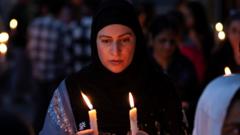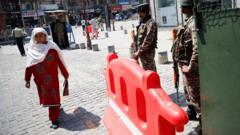Following the tragic death of her husband during a militant attack in Kashmir, Himanshi Narwal's appeal for peace led to her being trolled online. This article examines the disturbing backlash she faced, revealing the complexities of grief, societal reactions, and the precarious nature of public support in a divided nation.
From Grief to Hate: The Disturbing Shift in Perception of a Kashmir Attack Victim's Widow

From Grief to Hate: The Disturbing Shift in Perception of a Kashmir Attack Victim's Widow
Himanshi Narwal’s journey from symbol of tragedy to target of online abuse highlights the vicious cycle of public sentiment in India's polarized society.
Himanshi Narwal, a widow whose devastating loss captured the headlines, found herself at the center of a social media maelstrom after the brutal militant attack in Kashmir that killed 26 people. Just two weeks ago, her haunting image beside her husband's coffin while still in her honeymoon period resonated with many, turning her into a symbol of the tragedy that abruptly altered her life. However, her subsequent plea for peace and unity, urging the public not to blanket blame Muslims and Kashmiris, sparked an unexpected wave of vitriol.
The backlash began swiftly, as some who had shown compassion transformed into online trolls, assailing Narwal for what they perceived as a betrayal of her husband's memory. Critics claimed she was dishonoring him for not vilifying an entire community, while others maliciously spread rumors about her affiliations with Kashmiri men from her days at university. Despite the emotional turmoil she was navigating, Narwal stood her ground, insisting on a message of peace, stating, "We want justice, but not hatred."
In the fallout of her comments, notable figures like Vijaya Rahatkar from India's National Commission for Women decried the online harassment, stressing the need for discourse grounded in decency. Journalists and advocates echoed this sentiment, highlighting the particular cruelty faced by women during social media spats.
The story doesn't end with Narwal; her experience is suggestive of a broader pattern where female survivors of violence are mercilessly scrutinized and ridiculed online. Fellow victim Arathi R Menon, who also shared her loss, faced similar backlash for her calm demeanor during media interactions, further illustrating the harsh double standards in societal expectations of women.
Yet, amidst these challenges, Narwal received a stream of support from many who appreciated her courage. Activist Gurmehar Kaur expressed admiration for Narwal's strength, linking her experience to her own painful history of public toxicities following familial loss during conflict.
As the episode continues to unfold, calls for governmental action against the perpetrators of cyber harassment remain unanswered, leaving victims vulnerable. Observers caution that this pattern of backlash often consumes its targets before moving on to the next victim, indicating a troubling trend in society's handling of grief, empathy, and justice.





















